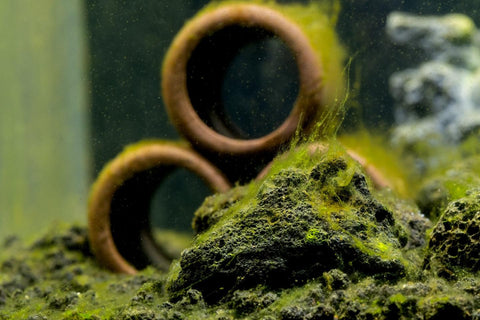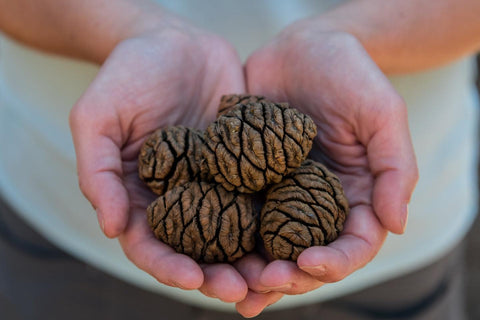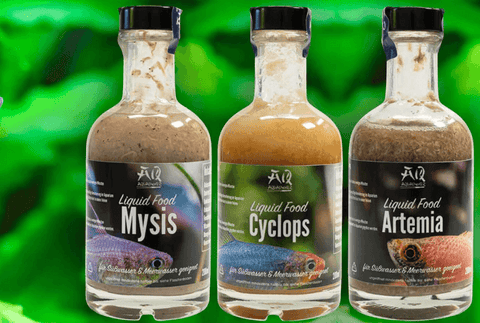Green algae is a common problem that many aquarium owners face. This algae can affect the appearance of the aquarium and even endanger the health of the fish and plants. In this comprehensive blog post, we will take a closer look at green algae in the aquarium and give you a variety of tips on how to effectively combat this problem.
What is green algae?
Green algae, also known as filamentous algae or beard algae, are a form of algae that can be caused by excessive growth in the aquarium. They are green in color and often form long, thread-like structures. Green algae usually grow in areas with high nutrient concentrations and bright light.
Causes of green algae in the aquarium
There are various factors that can contribute to the formation of green algae in the aquarium. These include:
- Too much light: Excessive lighting of the aquarium can promote the growth of green algae. Make sure you choose the right lighting duration and intensity for your aquarium.
- Excess nutrients: An oversupply of nutrients such as nitrate and phosphate can promote the growth of green algae. Regular water changes and appropriate feeding of the fish can help to control the nutrient levels in the aquarium.
- Poor water quality: Poor water quality can promote the growth of green algae. Check the water parameters regularly and make adjustments if necessary.
How to combat green algae
There are various measures you can take to combat green algae in the aquarium:
- Regular cleaning: Clean the aquarium regularly to remove excess algae. Remove algae from the walls, plants and decorations.
- Optimal lighting: Make sure you choose the right lighting duration and intensity for your aquarium. Avoid excessive lighting as this can promote algae growth.
- Nutrient control: Monitor the nutrient levels in the aquarium and take measures to avoid excess. Reduce the amount of food and carry out regular water changes to control the nutrient concentration.
- Promote plant growth: Healthy plants can help reduce algae growth by absorbing nutrients from the water. Make sure that your aquarium is sufficiently planted and that the plants have optimal growing conditions.
- Introduce algae eaters: Some species of fish and snails are known to eat algae. Introducing these algae eaters can help to control algae growth in the aquarium.
It is important to note that controlling green algae in the aquarium requires patience and perseverance. Consistency in implementing the above measures is crucial to achieve long-term results. If the algae growth persists despite your best efforts, you can also ask a professional for advice and support.
Prevention of green algae
The best way to combat green algae in the aquarium is prevention. Here are some preventative measures you can take:
- Choose the right lighting: Make sure you choose the right lighting for your aquarium. Avoid excessive lighting duration and intensity, as this can promote algae growth.
- Control the nutrient levels: Monitor the nutrient levels in the aquarium and take measures to avoid excess. A balanced diet for your fish and regular water changes can help to control nutrient levels.
- Avoid overfeeding: Only feed your fish in appropriate amounts. Excess food can lead to an increase in the nutrient concentration in the water, which promotes algae growth.
- Regular cleaning: Carry out regular cleaning work in the aquarium to remove excess algae and dirt. Clean the walls, plants and decorations to prevent the formation of green algae.
- Monitor the water quality: Regularly check the water parameters to ensure that the water quality is optimal. Make adjustments as necessary to maintain a healthy aquarium environment.
The use of chemicals to control algae
For stubborn cases of green algae, you can also consider chemical algaecides. There are various products on the market that have been specially developed to combat algae. However, before using such products, you should make sure that they are safe for your fish, plants and other aquatic life. Read the instructions carefully and use the products according to the specified dosages.
The role of water changes
Regular water changes are an important practice to combat green algae in the aquarium. By changing the water, you can remove excess nutrients and other impurities from the water. It is recommended to change about 20-30% of the water every 1-2 weeks. Be sure to treat the new water before adding it to rid it of chlorine or other harmful substances.
The most important points summarized once again
Green algae in the aquarium can be an annoying problem, but with the right measures and consistent implementation, you can combat this problem effectively. By controlling light, nutrients and water quality, as well as introducing algae eaters and maintaining healthy plants, you can reduce the growth of green algae. Remember that prevention is the best way to prevent green algae in the aquarium. You can create a healthy and attractive aquarium through regular cleaning, control of the water values and appropriate feeding.




Comments (0)
There are no comments for this article. Be the first one to leave a message!